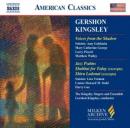Du bist ein Kind wie all die vielen,
die auf der ganzen Erde sind,
wie all die anderen Gespielen
und doch bist du so anders, Kind.
Du bist ein Kind, dem Heimat fehlt,
in allen Städten bist du fremd.
So lang dich nicht das Wort beseelt:
Heimat, dein Herz ist ungehemmt.
die auf der ganzen Erde sind,
wie all die anderen Gespielen
und doch bist du so anders, Kind.
Du bist ein Kind, dem Heimat fehlt,
in allen Städten bist du fremd.
So lang dich nicht das Wort beseelt:
Heimat, dein Herz ist ungehemmt.
inviata da Bartleby - 4/11/2011 - 13:12
Lingua: Inglese
Traduzione inglese di Bertram Kottmann da
The Lied, Art Song and Choral Texts Archive
The Lied, Art Song and Choral Texts Archive
A JEWISH CHILD
You are a child like all the others
that live all over our earth,
like all your world-wide sisters, brothers
and yet you are of different worth:
You are a child without a home,
you are a stranger everywhere -
until these words will be your own:
homeland, your heart is anywhere.
You are a child like all the others
that live all over our earth,
like all your world-wide sisters, brothers
and yet you are of different worth:
You are a child without a home,
you are a stranger everywhere -
until these words will be your own:
homeland, your heart is anywhere.
inviata da Bartleby - 4/11/2011 - 13:12
Lingua: Francese
Traduzione francese di Daniel Fesquet, dal programma di sala per “Terezín/Theresienstadt”, con Anne Sofie von Otter (mezzo-soprano), Bengt Forsberg (pianoforte), Daniel Hope (violoncello), Bo Nordenfeldt (contrabbasso, chitarra, accordéon)
UN ENFANT JUIF
Tu es un enfant comme tous ceux,
nombreux, qui peuplent la terre entiere,
comme tous les camarades de jeux –
et pourtant tu es autre, enfant.
Tu es un enfant sans pays,
étranger dans toutes les villes.
Tant que « pays » sera pour toi vide
de sens, ton coeur sera sans entraves.
Tu es un enfant comme tous ceux,
nombreux, qui peuplent la terre entiere,
comme tous les camarades de jeux –
et pourtant tu es autre, enfant.
Tu es un enfant sans pays,
étranger dans toutes les villes.
Tant que « pays » sera pour toi vide
de sens, ton coeur sera sans entraves.
inviata da Bernart Bartleby - 17/3/2014 - 14:08
Lingua: Ceco
Traduzione ceca dal libretto che accompagnava lo spettacolo “Stars of Terezín” tenuto a Praga nel 2013 dall’orchestra da camera Nash Ensemble di Londra.
ŽIDOVSKÉ DÍTĚ
Jsi dítě jako mnohé jiné
v celém širém světě,
jako všichni tvoji kamarádi,
a přece jsi tak jiné, dítě.
Jsi dítě, kterému chybí vlast
v každém městě jsi cizincem.
Dokud není tvá duše naplněna slovem vlast,
je tvé srdce bez zábran.
Jsi dítě jako mnohé jiné
v celém širém světě,
jako všichni tvoji kamarádi,
a přece jsi tak jiné, dítě.
Jsi dítě, kterému chybí vlast
v každém městě jsi cizincem.
Dokud není tvá duše naplněna slovem vlast,
je tvé srdce bez zábran.
inviata da Bernart Bartleby - 23/4/2014 - 15:38
Lingua: Italiano
Versione italiana di Francesco Mazzocchi
UN BAMBINO EBREO
Tu sei un bambino come tutti gli altri
che sono su tutta la terra,
come tutti gli altri compagni di giochi
e però tu sei così diverso, bambino.
Tu sei un bambino cui manca patria,
in tutte le città sei straniero.
Intanto che non hai nell’anima la parola:
patria, il tuo cuore è senza legami.
Tu sei un bambino come tutti gli altri
che sono su tutta la terra,
come tutti gli altri compagni di giochi
e però tu sei così diverso, bambino.
Tu sei un bambino cui manca patria,
in tutte le città sei straniero.
Intanto che non hai nell’anima la parola:
patria, il tuo cuore è senza legami.
inviata da Francesco Mazzocchi - 24/6/2024 - 14:25
×
![]()





Parole di Carlo ed Erika Taube
Musica di Carlo Taube
Testo trovato su The Lied, Art Song and Choral Texts Archive
Carlo Taube
Una ninna nanna per soprano e pianoforte, unica composizione a noi pervenuta del musicista polacco Carlo Tauber. Venne scritta per essere interpretata da sua moglie Erika quando entrambi si trovavano rinchiusi nel ghetto di Theresienstadt. A Terezín Carlo fu l’appassionato direttore dell’orchestra del campo, oltre ad esibirsi in innumerevoli concerti per pianoforte solo. Poi, nell’ottobre del 1944, Carlo, Erika e i loro bambini vennero trasferiti ad Auschwitz e lì immediatamente uccisi.
Canzone interpretata da molti artisti, come il basso baritono tedesco Christian Gerhaher insieme alla mezzo-soprano svedese Anne Sofie von Otter nel disco intitolato semplicemente “Terezin/Theresienstadt”, pubblicato nel 2008 dalla Deutsche Grammophon.
In Italia, qualche anno fa, questa e altre canzoni di donne, ebree e non, internate nei campi nazisti sono state proposte da Charlette Shulamit Ottolenghi, cantante italo-israeliana, nel recital "Dalle Profondità - canti di donne nella Shoah", con Alexander Zlotnikov al pianoforte e Ludmilla Zlotnikov al violoncello.